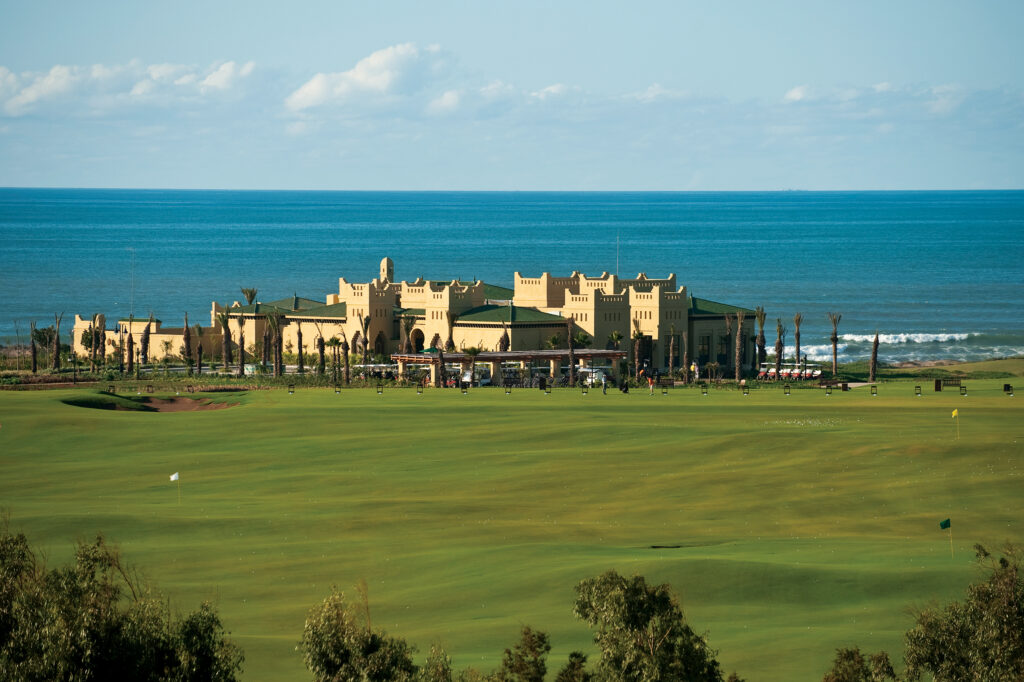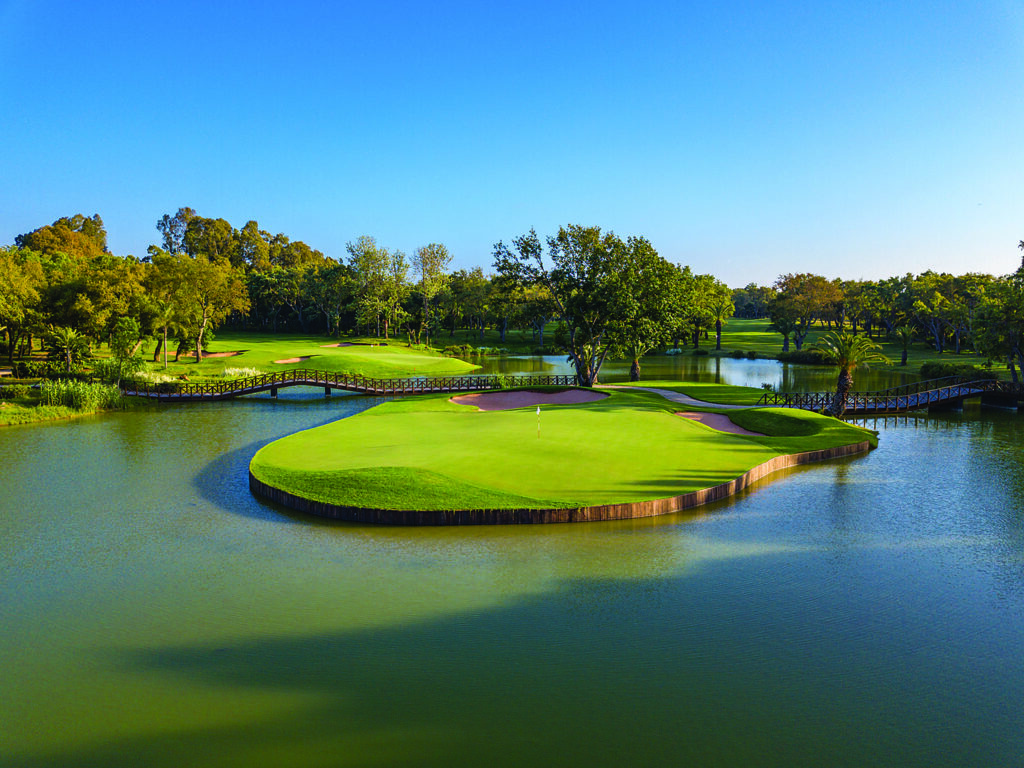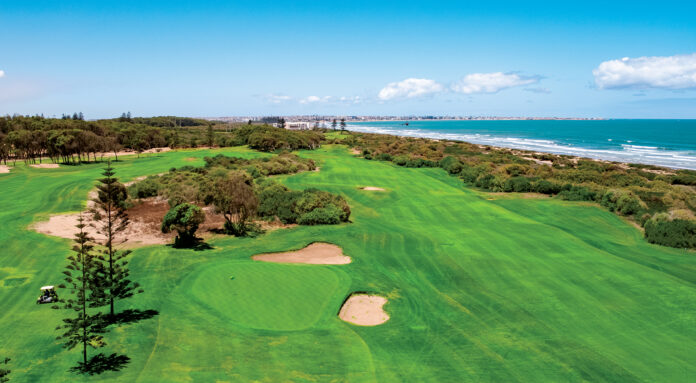By Jo Maes, President European Golf & Travel Media Association
Morocco is fast on track to become a powerhouse in golf tourism.
The pride of golf in Morocco is undoubtedly the Red Course of the Dar es Salam Golf Club. Situated in the seaside capital city of Rabat, this is where the Royal family resides and the Moroccan Golf Federation has their headquarters.
Back in the 60’s when Robert Trent Jones was designing Valderrama, the then King of Morocco Hassan II, a keen golfer, asked RTJ to come and take a look at this area inside the city where he was aiming to build a golf complex. Hassan II had a vision (and the finances) to put the country on the golf map and the Moroccan’s had already seen the who’s who of professional golf play. Winners of the Hassan II Trophy over the years were Billy Casper, Payne Stewart, Lee Trevino, Roger Maltbie, David Toms, Nick Price, Ernie Els, Sam Torrance, Padraig Harrington and many more. The event started in 1971 when Orville Moody took the first trophy. It currently is a venue on the PGA Tour Champions schedule.
The Moroccan Royal Family has a hand in every sporting initiative and golf is no different. The eldest son of Hassan II, King Mohammed VI, is the fifth wealthiest monarch in the world. His brother, Moulay Rachid and his sister Lalla Meryem, are the ones involved in golf. Under their reign, the country has undergone many reformations and has become a modern society with a vibrant economy.
So, back in the 60’s, RTJ came and was commissioned to design the Red, Blue and Green course which have become 45 of the most impressive holes in Morocco. The Red is a monster from the back tees measuring 7.372 yards for a Par of 73. Recently upgraded by Coore & Crenshaw in cooperation with the Prince Moulay Rachid, all (massive) bunkers and (equally massive) greens were redesigned to create a superb test of golf. While the PGA Champions are battling it out on the Red, the European Ladies Tour have their event at the same time on the Blue Course. It is obligatory to use one of the local caddies and mine was Mohammed with badge Nr. 1 as he had been there for 54 years. They are well worth it to guide you around the course and get your ball on the occasional stray shot.
The city of Rabat was founded in the 12th century and has seen many occupants. It was a pirate base from where the Corsairs raided the Spanish and Portuguese ships, overflowing with goodies on their way home from the East and West. It is now the cultural, religious and political capital of Morocco. There are plenty of landmarks to see including a visit to the Royal Palace, the Kasbah, the Hassan Tower, the Royal Mausoleum and plenty more.
Just south of Spain, Morocco is becoming a great golf tourism alternative. Some of the most recent James Bond and Mission Impossible movies have all had scenes shot in Morocco. The Strait of Gibraltar, the entrance to the Mediterranean, is a 9.3 mile sea passage covered by numerous ferries connecting the African and European continents. Morocco is one of the world’s biggest growers of fruit and vegetables all destined for Europe and all of this produce has to get across the narrow passageway making it one of the busiest crossings anywhere.
From Tarifa in Spain, you end up in Tangier, a city synonymous with spies, diplomats and artists and where in 1914 the first golf course in Morocco was established. The Royal Country Club of Tangier is old school with narrow dog legged fairways and small greens, a quaint historic clubhouse with probably one of the best restaurants in the city. Just outside of Tangier, the new layout of the Hilton Al Houara covers a massive area along the Atlantic Ocean. The Graham Marsh course, with input from Vijay Singh, is a modern golf course with multiple tees and massive greens. The practice facilities are a golfer’s dream and one could spend plenty of time in the on-site Hilton hotel overlooking the Atlantic.
Farther South is Casablanca, Morocco’s largest city and the economic capital. It’s Morocco’s main seaport and one of the world’s largest artificial ports. About 40 minutes outside of Casablanca, we head to El Jadida and Mazagan. Built by the Portuguese to protect their ships heading East, the fortified city is a UNESCO World Heritage site and is definitely worth a visit.
Nearby, you will find The Golf EL Jadida, a pleasant course designed by Cabell B. Robinson that runs through a Eucalyptus forest and with the final 3 holes along the sea, finishes like a links. It’s almost always windy which increases the difficulty but will still provide a pleasant round for all abilities.

Farther along the coast, the fabulous Mazagan Beach, Golf & Spa Resort is a sight to behold and a destination all its own. Conceived by Sol Kerzner who built the Sun City complex in South Africa, it offers 492 rooms, Morocco’s largest casino, 13 restaurants and bars including one right on the beach, several play areas, pools and a fantastic Gary Player designed golf course. Its size is staggering as it covers over 600 acres, has 4 ½ miles of beach, and provides employment to between 1000 and 1800 people, including 70 greenkeepers.
It Mazagan Beach is the longest course in North Africa measuring 7,530 yards and, although it would be sacrilege to call it a ‘links’ it has many of the characteristics of a links course. With hardly a tree in sight, plenty of wind, it meanders through the low lying dunes and features plenty of seaside holes. Not one hole is the same and it requires plenty of different shot shapes to manage a decent score. Complemented by exemplary practice facilities, a fully equipped gym and a spa to relax after your round, it is definitely worth a look.
North of Casablanca, near the town of Bouznika, the Bahia Golf Beach Resort features another Cabell B. Robinson design. With 100 bunkers it is no pushover. The Vichy Celestins Spa Hotel is bright and make sure to head to the beach and the Chiringuito bar and restaurant where the setting sun accompanies the local delicacies.
There is some real estate along the opening and closing holes of the back 9 but nothing intrusive and one of the unique features of this course is how they built the tee boxes. They are raised and contained, flat like billiard tables and with gravel around them to minimize water consumption.

Next February, the PGA Tour Champions will head to Rabat and the Red Course. The tournament will be hosted by the Hassan II Trophy organization, the Royal Moroccan Golf Federation all coordinated by the Royal Palace itself. That same week, the Ladies European Tour will play on the Blue Course. Morocco has ambitions to become a powerhouse in golf and golf tourism. Their new national academy likely will become the envy of the golf world where local golfers will be trained to the highest standards to start competing with the best golfers in the world.
Morocco is a magical place. It’s steeped in history from the Phoenicians (800 to 300 BC) through the Alaouite Dynasty (1666-present) and the current Royal Family. It is an enlightened society where the current King Mohammed VI took a more liberal course by increasing rights for women, creating a parliamentary system and decreasing influence of the extreme Islamist movements. They are also very active in Women’s Golf Day and Elisa Gaudet joined us on the trip to discuss further initiatives with the Moroccan Golf Federation. This is now a very safe country with vibrant cities, law and order, a great food culture that can rival the best of the world’s cuisines. Through all the reforms, the country does retain its Saharan Berber mystique. It can get hot in Morocco but many of the courses are seaside with an Atlantic breeze providing a welcome coolness. This is a country well worth considering with plenty of non-stop flights from the USA.

